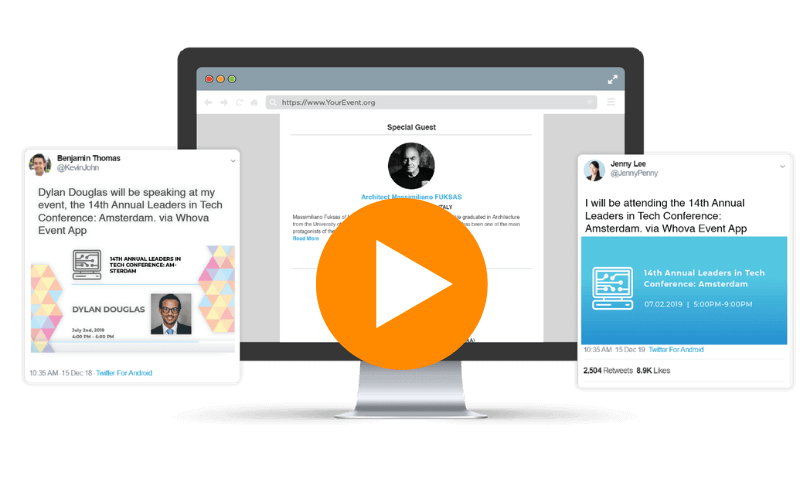When planning an event, having a professional website is necessary to effectively promote and manage the experience. Event websites are necessary to centralize information, increase ticket sales, and provide an integrated attendee experience.
However, creating an event website from scratch is time-consuming and overwhelming, especially for event organizers with limited technical expertise. You want a platform that is easy to use, customizable, and affordable.
After thorough research and evaluation, we compiled a list of the 8 best website builders for events, considering factors such as ease of use, design options, and integrations with event management tools.
Let’s get started.
What to Consider When Choosing a Website Builder for Events?
When choosing a website builder for events, there are several factors to consider. Here are some of them:
- Ease of use: Look for a website builder that is easy to use, even for beginners. The platform should have a user-friendly interface and simple navigation.
- Design templates: The website builder should offer a variety of design templates that are suitable for events. Make sure the templates are customizable and can be tailored to your specific needs.
- Event-specific features: Consider a website builder that offers event-specific features, such as event registration, ticketing, and RSVP management. Whova is a great example.
- Integration with other tools: Look for a website builder that can integrate with other tools you may be using, such as email marketing software, event registration platforms, social media platforms, event planning platforms, and payment gateways.
- Customer support: Choose a website builder that offers excellent customer support, such as live chat, email, and phone support.
- Pricing: Consider the pricing of the website builder, any hidden fees, or additional costs. Make sure the pricing fits within your budget.
- Security: The website builder should prioritize security, including data encryption and SSL certification.
Top 8 Website Builder Picks for Events
1. WordPress
G2 rating: 4.4/5
WordPress takes the crown spot for a reason. It powers 34% of the internet and is renowned for providing unmatched flexibility and customization for event websites. While it requires a bit more technical know-how compared to drag-and-drop builders, its flexibility makes it a favorite for those who want complete control over their website’s design and functionality.
Key features:
- Self-hosted: WordPress is a self-hosted platform, which means you have complete control over your website’s files and hosting.
- Plugins: It has a vast library of plugins. From managing events and registrations to integrating ticketing and email marketing, there’s a plugin for (almost) everything.
- Themes: Thousands of free and premium themes are available that offer a wide range of design options tailored for events.
- SEO friendly: WordPress is inherently search engine friendly, which makes it easier for attendees to find your event website.
- Scalability: As your events grow, your website can grow with them. WordPress can handle complex websites with high traffic volumes.
Pros:
- Doesn’t require in-depth coding knowledge
- Being an open-source platform, WordPress gets constantly updated
- Extensive online resources, tutorials, and a vast community for support
Cons:
- Building a website with WordPress requires more technical knowledge compared to drag-and-drop builders.
2. Whova
G2 rating: 4.8/5
Whova streamlines the process of building event websites by automatically converting event details such as sessions (agenda), speakers’ profiles, sponsors, exhibitors, and more into web pages. Users can choose from a variety of customizable templates to create a professional-looking event website without the need for additional manual work.
Key Features:
- Automated website generation: Whova automatically creates an event website based on the information you enter in your event management dashboard. This includes sessions (agenda), speaker profiles, sponsors, exhibitors, and more.
- 20+ customizable templates: Whova provides a range of ready-to-use templates that users can customize to reflect their branding and event theme.
- Integration with Whova App: Whova’s event website integrates with its companion mobile app to provide attendees with a unified experience across both platforms.
Pros:
- Significantly reduces time and effort compared to building a website from scratch.
- Whova websites are optimized for mobile devices
- Intuitive and user-friendly interface
- Suite of event management tools that cover event registration, ticketing, attendee engagement, networking, and analytics.
Cons:
- May not provide the same level of design flexibility as self-hosted website builders.
3. WebFlow
G2 rating: 4.4/5
Webflow bridges the gap between code-free website builders and traditional web development. It offers a visual interface with powerful design capabilities that make it a great option for event planners seeking both creative control and ease of use.
Key features:
- Visual design interface: Drag-and-drop functionality allows you to design and customize layouts, typography, colors, and animations.
- CMS integration: Webflow’s built-in content management system (CMS) makes it easy to manage event details, speaker information, schedules, and more.
- Clean code export: If needed, Webflow allows you to export clean, production-ready code for your website.
- E-commerce functionality: For events that require ticket sales or merchandise purchases, Webflow offers e-commerce functionality that allows users to create and manage online stores seamlessly.
Pros:
- Unparalleled design flexibility
- Does not require users to write code
- Provides integrated hosting and publishing services
- Vibrant community of designers, developers, and users who contribute to its ecosystem through forums, tutorials, templates, and resources.
Cons:
- Steeper learning curve
- Subscription plans are relatively expensive compared to other website builders.
4. Wix
G2 rating: 4.2/5
Wix is a popular website builder known for its user-friendly interface and extensive feature set. It’s a solid option for creating professional-looking event websites with a moderate level of complexity.
Key Features:
- Drag-and-drop editor: Wix’s intuitive editor allows you to visually design your event website without coding knowledge.
- Large template library: You can choose from a vast collection of event-specific templates as a starting point for your website design.
- Mobile-optimized websites: Wix websites are automatically responsive and optimized for viewing on mobile devices.
- App market: Wix allows you to extend the functionality of your website with additional apps from the Wix App Market, including options for email marketing, social media integration, and analytics.
Pros:
- Perfect for beginners with no coding experience.
- Offers both free and paid plans
- Comprehensive customer support through various channels
Cons:
- Limited design flexibility
- The free plan includes Wix branding on your website
- Once a template is chosen and customized, switching to a different template is challenging without rebuilding the website from scratch
5. SquareSpace
G2 rating: 4.4/5
Squarespace offers beautiful design templates, ease of use, responsive design, built-in features for events, and integrated e-commerce functionality. It’s ideal for creating professional event websites with built-in features for promotion and sales.
Key features:
- Built-in event features: Squarespace offers a range of built-in features and tools specifically designed for event websites, including event calendars, RSVP forms, ticketing integration, and countdown timers.
- Range of design templates: Squarespace offers a wide selection of professionally designed templates that are modern, elegant, and visually appealing. The platform is known for its sleek and sophisticated design aesthetic.
- Ecommerce integration: You can sell event tickets or merchandise directly through your website with built-in ecommerce functionalities.
- Marketing tools: Squarespace offers built-in email marketing tools and integrations with social media platforms to promote your event.
- Scalable: Users can add new pages, features, and integrations to their websites as needed, without the need for extensive redevelopment.
Pros:
- User-friendly drag-and-drop editor and intuitive interface
- Beautiful design templates
- Integrated solutions eliminate the need for third-party plugins
Cons:
- Limited app integrations
- Ecommerce features are not very robust for complex ticketing or merchandise sales
6. Zoho Sites
G2 rating: 4.1/5
Zoho Sites is a website builder from Zoho, a company known for its suite of business productivity tools. Although it is not exclusively focused on events, Zoho Sites offers features and functionalities that make it suitable for creating event websites.
Key features:
- Event-specific elements: Zoho Sites offers pre-built sections and elements specifically designed for events. This includes features like calendars, schedules, speaker profiles, and registration forms.
- Zoho integrations: Zoho Sites integrates with other Zoho applications, including Zoho CRM and Zoho Forms that streamline event management tasks.
- SEO tools: Built-in SEO tools help improve your website’s search engine ranking and increase event visibility.
Pros:
- Unified event management workflow for existing Zoho users
- Offers a free plan with limited features so you can try it out before committing
Cons:
- Advanced features and customization options require a learning curve for users with limited technical expertise
- Limited third-party integrations
- Zoho Sites isn’t specialized in event websites so it has fewer event-specific templates
7. Jimdo
G2 rating: 3.9/5
Jimdo is a user-friendly website builder that caters well to beginners and solopreneurs. It’s a solid option for creating a website to promote your events, especially if you don’t have extensive technical experience.
Key features:
- Easy-to-Use Editor: Jimdo offers an intuitive and user-friendly editor that allows users to create event websites without any coding knowledge.
- Mobile Optimization: All Jimdo websites are optimized for mobile devices, ensuring that event websites look and perform well on smartphones and tablets.
- Integrated Blogging: Jimdo includes built-in blogging functionality, allowing users to create and publish blog posts related to their events.
- SEO Tools: Jimdo provides basic SEO tools to optimize page titles, meta descriptions, URLs, and other elements to enhance their website’s search engine ranking and attract more organic traffic.
Pros:
- Jimdo allows users to test the platform with a free trial
- Exceptional multichannel customer support
- Mobile responsiveness
Cons:
- Customization features of Jimdo are limited
- Jimdo ecosystem is also limited for third-party integrations
8. Carrd
G2 rating: 4.5/5
Carrd prides itself on its simplicity and ease of use, making it accessible to users of all skill levels. The platform’s minimalist design and straightforward editor enable users to create event websites quickly and easily, without the need for technical expertise or coding knowledge.
Key features:
- Single-Page Websites: Carrd specializes in creating single-page websites, which are ideal for event websites that require concise and focused content.
- Embed Integrations: Carrd allows embedding elements from other services like YouTube trailers, Google Maps, or social media feeds.
- Form Builder: You can create custom forms within your Carrd website to collect RSVPs, registrations, or any other information you need from potential attendees.
Pros:
- Very simple and easy-to-use interface
- Wide variety of templates
Cons:
- No ecommerce functionality for ticketing
- No built-in analytics
Wrapping up: What’s THE Best Website Builder for Events?
The best website builder for your event is the one that strikes the perfect balance between ease of use, event-specific functionality, and design flexibility, all within your budget.
However, after evaluating the top website builders in the market, each with its own strengths and weaknesses, we found that Whova stands out as the best solution for event websites. With its intuitive interface, automated website generation, and seamless integration with event management tools, Whova significantly streamlines the process of creating and managing event websites.
Sign up for Whova today and start building your professional event website.

